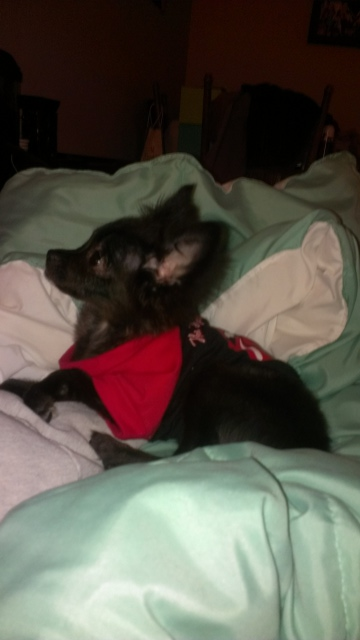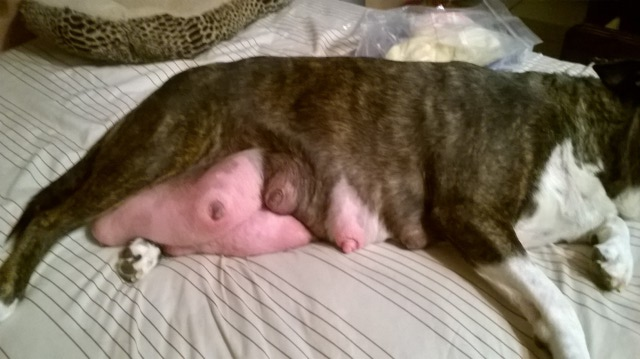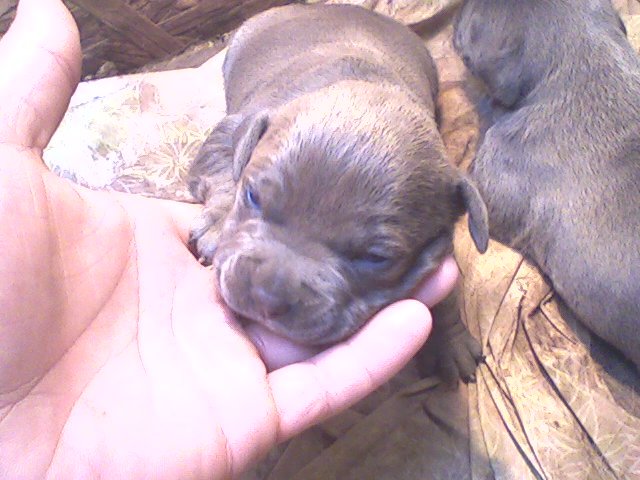QuestionHello Sir. I have a female Rottweiler aged 2yrs. She has been bred recently (20-July and 22-July) and it was a planned breeding with two matings, one on 10th day and the other on 12th day of the heat cycle. On both the days tie happened for 10 minutes each. For the last 4 days she has been off the food. Doesn't show any interest in eating. She is fed on Pedigree (professional range) diet from the puppyhood and doesn't show interest in eating now. She hardly eats around 300grams per day. During the last 4 days I have tried Royal Canin, and other brands of food but no improvement noticed. But, when I give her cooked chicken (without bones) or canned food she will eat only the chicken and spits the pedigree (even tried soaking dry food in water, no luck)She looks very active, energetic and loves to go for walks. Is this behaviour normal and can this be considered as a pregnancy symptom. Also, please advise if I can feed her only on cooked chicken. Many thanks for your help.
AnswerHi Phani,
Congratulations! It sounds like your dog is pregnant!
It's not at all unusual for dogs to get the same kind of morning sickness many women experience in the early stages of pregnancy. It's different with every dog, but some dogs do better with evening feedings during the period of morning sickness. In most cases, the "sick" phase only seems to last for about two to three weeks, sometimes just a bit longer. At this point, the hormones are more stable and most dogs seem able to adjust to the pregnancy at this stage. However, if she completely stops eating for more than 1 to 2 days, consult your veterinarian.
Ginger has long been associated with alleviating nausea. You could brew some ginger tea (sweeten it was a little honey) let it cool, and see if your dog will take some. If your dog won't drink the tea, you could use Ginger capsules (250 mg.) two times daily. These should help her morning sickness.
Only feeding a dog cooked chicken isn't a nutritionally complete diet for any dog, much less a pregnant dog. Continue to feed the normal amount of her regular adult dog food. There is little growth of the puppies during the first 4 to 5 weeks of pregnancy. Excess feeding early in pregnancy tends to add unnecessary fat, which will make delivery more difficult and increase the risk of complications.
During the last 3 to 4 weeks of pregnancy, the puppies begin to grow rapidly. This puts a big demand on nutrients and your mother-to-be will need more energy. During this final part of pregnancy, your dog's weight should gradually increase by 25 to 30 percent. For this reason, during the last 3 to 4 weeks of pregnancy, your dog should be gradually fed more and more food until she is eating about 25 to 30 percent more food by the time she delivers. This means that if your dog normally eats 1 cup of food twice a day, you should slowly increase her food until she is eating 1 1/4 to 1 1/3 cups of food twice a day. Also, it is a good idea to gradually switch her food over to a diet that contains more calories per mouthful. This is easily accomplished by feeding your expecting dog a puppy food diet. By feeding your adult dog a puppy food, she will be able to consume the necessary nutrients to provide for her rapidly growing litter.
How often you feed your dog will vary and may depend on the size of the litter. Some dogs with large litters do not have enough space to eat a big meal twice a day. You may have to provide small frequent meals throughout the day. Some people are successful leaving the day's ration in the bowl and allowing the dog to nibble at will. If you do decide to let her self-feed, it is very important to make sure your dog is eating enough food. A poor diet, especially late in pregnancy, can lead to pregnancy toxemia.
Just before delivery, your dog will drastically reduce the amount of food she eats and some will even stop eating. This is one of the signs that within the next 24 to 48 hours, puppies may be born. Leave food available in case she does want to eat, but don't expect her to have the same appetite. This decrease in appetite is nothing to worry about.
Do NOT feed calcium rich foods during pregnancy, ESPECIALLY in the last 10-14 days. Do NOT supplement with calcium during the time they are pregnant. Your dog still needs the normal amount of calcium in her regular diet. Some dams need the extra weight, and you can give puppy food, but stop the puppy food at least 10 days before the expected whelp. Then after pups are born, go back to puppy food. This is needed for the uterus to contract properly.
Because a dog's pregnancy lasts 63 days on average, you can expect your dog's litter to be born between 17 September - 23 September.
Best of luck!
Patti

 Helpppp
Question
Maddy
I have a 9 month peekapoo. She is pad tr
Helpppp
Question
Maddy
I have a 9 month peekapoo. She is pad tr
 new puppy
Question
bella
I adopted a puppy from the humane
new puppy
Question
bella
I adopted a puppy from the humane
 dog size
Question
raven
I have a 5 month old Pomeranian/C
dog size
Question
raven
I have a 5 month old Pomeranian/C
 Engorged Breasts
Question
mamma
My Friends Dog Had A Litter About
Engorged Breasts
Question
mamma
My Friends Dog Had A Litter About
 Puppy help? does this look like a nice quality puppy?
Question
3 weeks old
im getting this blue nose puppy so
Puppy help? does this look like a nice quality puppy?
Question
3 weeks old
im getting this blue nose puppy so